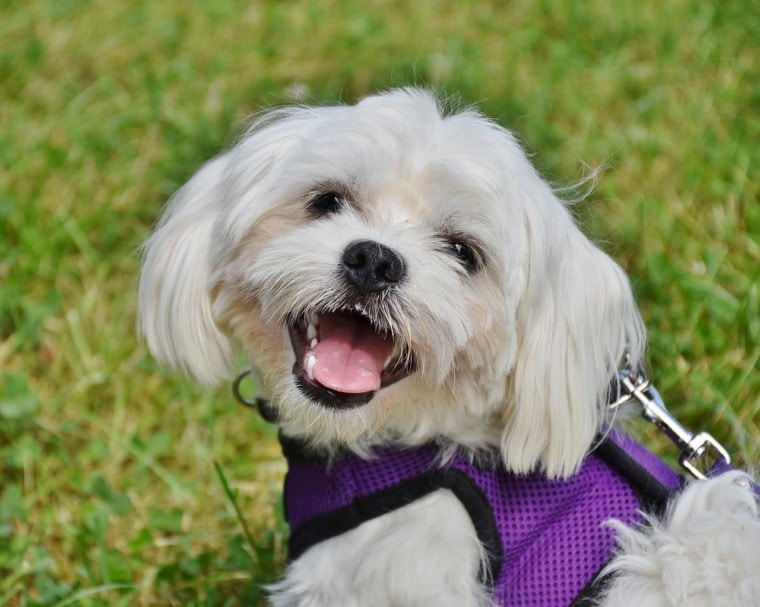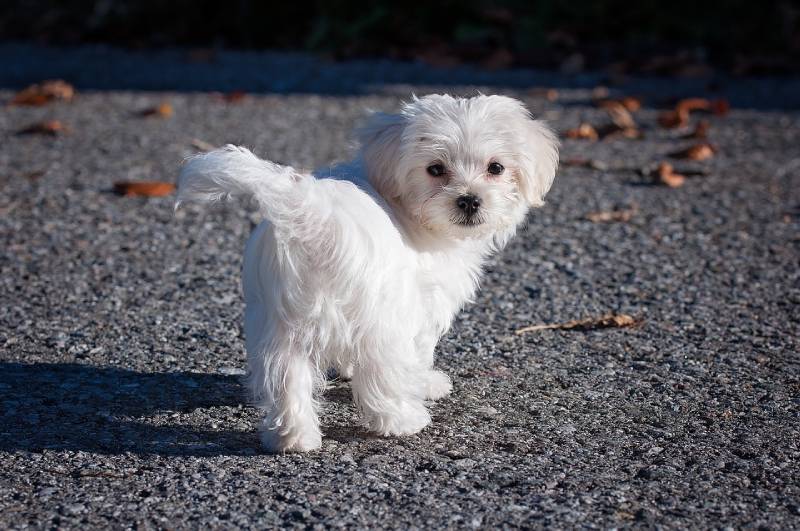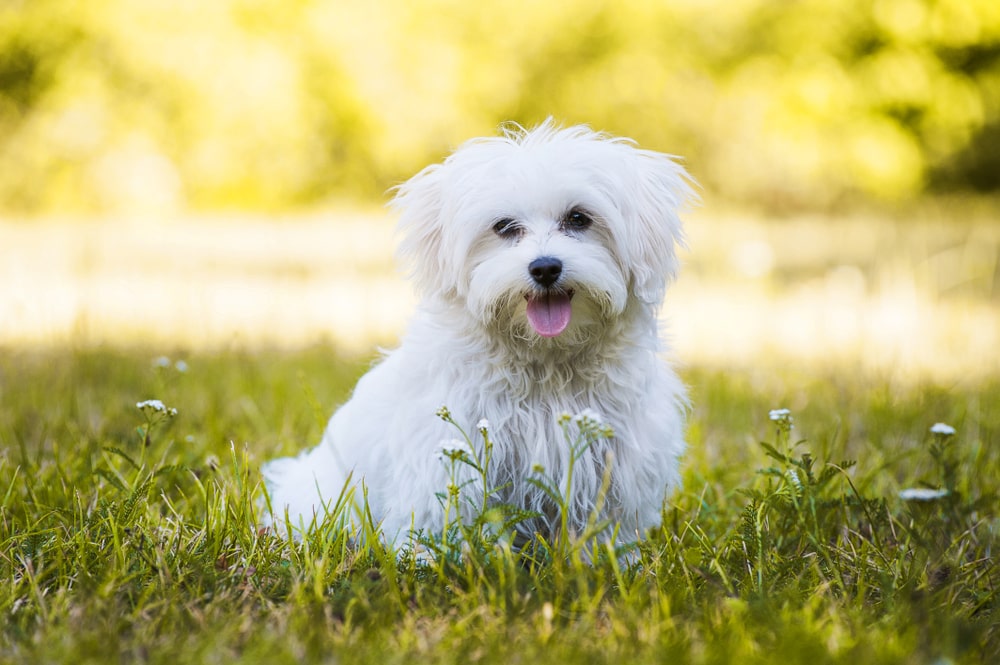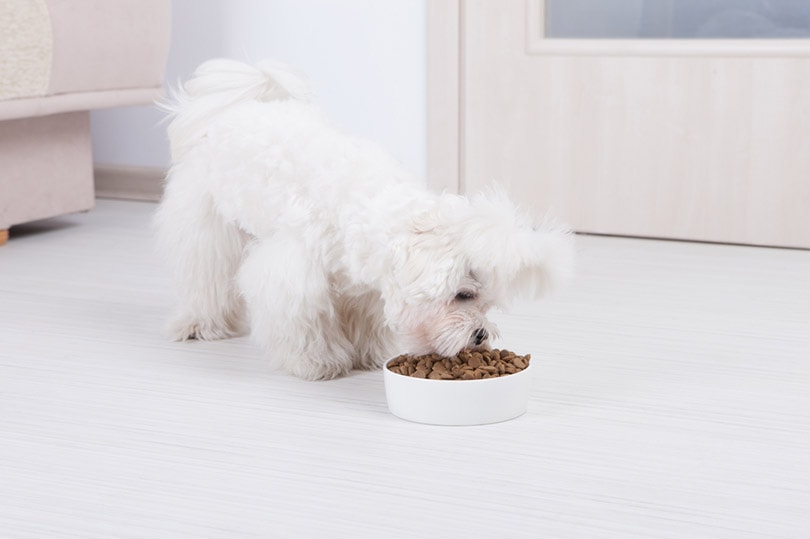
Click Below to Skip Ahead
“Ye Ancient Dogge of Malta” is a fabulous toy breed that sports a silky, luxurious coat, but a surprisingly low-maintenance personality. These lovable pups are just plain cute, from their little black button noses to the fluffy, upright tail that elegantly falls over the back. They are known for their expressive faces and charming antics.
Breed Overview
Height:
7 – 9 inches
Weight:
Up to 8 pounds
Lifespan:
12 – 15 years
Colors:
White, white & lemon, white & tan
Suitable for:
Those looking for a small watchdog or a low-shedding dog; Seniors, singles, couples, families with older children
Temperament:
Loyal, adaptable, protective, loving
Their moderate energy level, small size, and happy willingness to provide companionship make them particularly popular with older people. They can be quite stubborn little dogs, which can make training a challenge. The Maltese may not be the dog for everyone, but it can make a wonderful companion in the right home.
Maltese Characteristics
 Maltese Puppies
Maltese Puppies

Maltese have become a popular dog breed because of their loving personalities and small size. When looking for a Maltese pup, make sure to find an ethical and reputable breeder. Always make sure they let you visit the breeding facilities to ensure their practices are ethical and they care for the dogs. Also, visit the puppy’s parents to see how healthy they are and to have an idea of the puppy’s temperament.
Maltese dogs tend to be great with children and seniors, and are very adaptable to their environment. They are very affectionate and will create strong bonds with their families.

Temperament & Intelligence of the Maltese
Are These Dogs Good for Families? 👪
A Maltese could be a good fit for families under the right circumstances. These are not a top pick for homes with children, especially small children, for a few reasons. The biggest reason is the size of the dog. They are so small and could be easily injured by a rambunctious child. They also aren’t great dog if you’re hoping for an active dog that will play with children in the backyard. Although they do enjoy playing, they are not a particularly high-energy breed. As with any dog, children should be taught how to properly handle the dog and respect its boundaries.
Does This Breed Get Along with Other Pets?
Overall, Maltese can be pretty indifferent to other pets in the home. They aren’t the top choice for a dog that will enjoy socialization with other animals, but they aren’t likely to be aggressive either. Proper introductions and supervision are necessary to ensure successful meet and greets with other animals. Be cautious with small animals, especially those smaller than cats, like rodents, reptiles, and birds, as these are the most likely to be hurt by a dog.
 Things to Know When Owning a Maltese:
Things to Know When Owning a Maltese:
Food & Diet Requirements 🦴
Maltese are tiny dogs, so their food requirements are minimal. They aren’t particularly prone to obesity, but they will become overweight or obese if overfed. It’s always important to properly measure your dog’s food, but it’s even more important when the dog is only meant to weigh a few pounds. A high-quality food will support a luxurious coat, energy levels, and overall health. If you’re unsure what to feed your dog or how to properly portion out food, talk to your veterinarian or a veterinary nutritionist for guidance. A properly marked measuring cup is a necessity to ensuring you’re portioning food accurately.

Exercise 🐕
This breed doesn’t have high exercise needs, but they do appreciate some play and exercise every day. Each dog is different, so you may end up with a Maltese that wants to walk a mile and then play when you get home, or you may end up with a Maltese that wants a quick walk around the block and then a nap. Surprisingly, this breed can be a good option for agility competitions, which is a terrific way to keep your dog healthy and burn excess energy.
Training 🎾
Maltese are known to not be particularly easy to train. According to the book The Intelligence of Dogs by Stanley Coren, Maltese rank number 59 out of 79 dog breeds for intelligence, which puts them in the “Fair Working/Obedience Intelligence” category. This means that they aren’t highly trainable dogs, but they can be trained with repetition and reward. It may take time to train your Maltese, but they tend to respond to positive reinforcement and will learn over time if you are committed to the training regimen
Grooming ✂️
The Maltese doesn’t have the grooming needs you’d probably think it does. They are low shedding dogs, but they do require brushing every day or two to ensure mats and tangles don’t form in their long coat. If their coat care is not meticulously kept up at home, they are prone to painful matting and tangles, which can both lead to poor coat health and skin infections. A visit to the groomer every 4–6 weeks is ideal for this breed since a groomer will be able to thoroughly care for the coat in a way you may not be able to achieve at home.
- Related Read: Can a Maltese Only Have White Fur?
Health and Conditions 🏥
Male vs Female
Female Maltese tend to be smaller and more delicate than males, although the males do tend to stay around 7–8 pounds. There aren’t notable differences in the personalities of the males and females that are specific to this breed. Overall, female dogs tend to be more protective and loyal, while male dogs tend to be more playful and loving.
3 Little-Known Facts About the Maltese
1. They’re ancient.
The Maltese breed was established when the world was still in BCE! They are mentioned in both ancient Roman and Greek literature, as well as making appearances in artwork and historical documents. Aristotle himself mentioned the Maltese around 370 BCE. The breed was originally called “Melitaie,” which creates some confusion about the actual origin of the dog. Although generally believed to be from Malta, there are some who think the breed may have originated on the island of Mljet off the coast of Croatia.
2. Their noses can change colors.
The standard for Maltese includes a dark black nose. However, when exposure to sunlight is lacking, their noses tend to lighten, turning pink, tan, or brown. The good news is that with adequate sunlight, this color change usually corrects itself. This occurs commonly enough that it even has a name, “winter nose.”
3. One of the richest dogs was a Maltese.
In 2007, Leona Helmsley, a billionaire by way of hotels and real estate, passed away, leaving $12 million of her fortune to her Maltese, Trouble. Leona served time for tax evasion and was frequently referred to as “The Queen of Mean,” but even the gruffest people often have soft spots for their pets. However, a judge ruled that $12 million exceeded what was necessary to care for Trouble, leaving her and her new caretaker with a paltry $2 million. In the end, Trouble lived her life in the lap of luxury until she passed away at the age of 12 in 2011. If you’re curious what that money went toward, Trouble’s annual expenses ran around $100,000 for things like food, grooming, medical care, and a full-time security guard.

 Conclusion
Conclusion
The Maltese is a wonderful breed that is cute as can be and has a lovely personality. They are not overly high-maintenance dogs, but they do require regular coat maintenance to keep the coat and skin healthy. Routine grooming sessions are a great option for people who are unable to perform grooming tasks at home, but the coat should be kept up at home with brushing.
If you’re looking for a great family dog, the Maltese likely isn’t what you’re looking for. However, this breed is a great pick for older people and low activity homes. They can be a good fit for agility and other sports, but this will vary greatly from dog to dog. Choosing a responsible Maltese breeder is important since this cute breed is often bred by puppy mills and backyard breeders. If you get a healthy, well-bred Maltese, you’ll have many years of companionship from a lovely little dog.
See also:
- Teacup Maltese: Facts, Overview, Temperaments & Traits
- Why Is My Maltese Licking So Much? 14 Likely Reasons
Featured Image Credit: Pixabay

 Maltese Puppies
Maltese Puppies Things to Know When Owning a Maltese:
Things to Know When Owning a Maltese:




